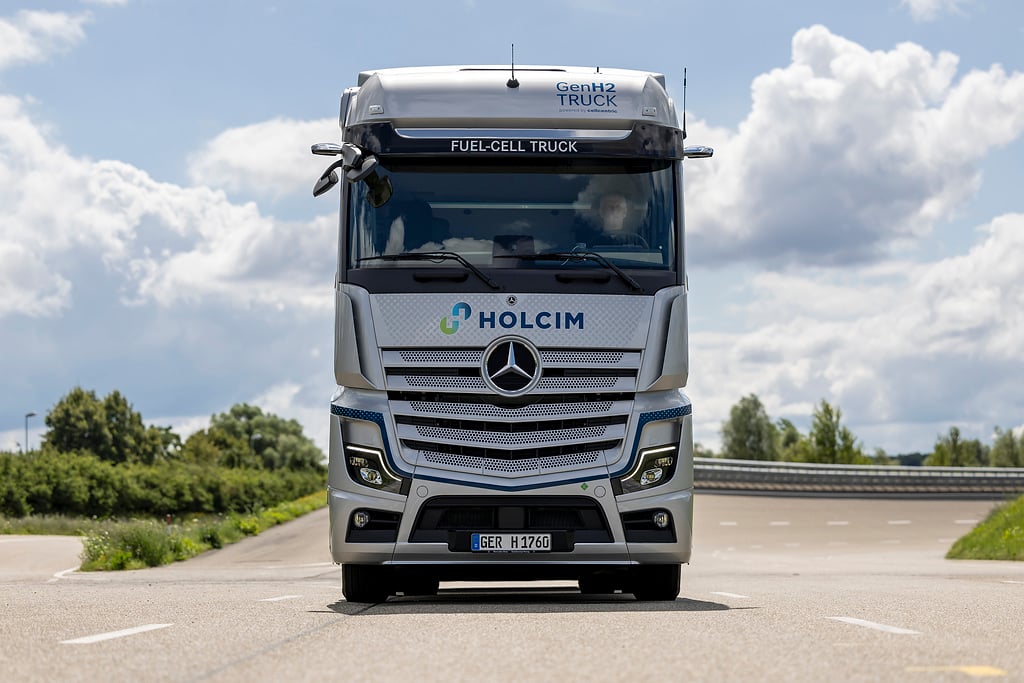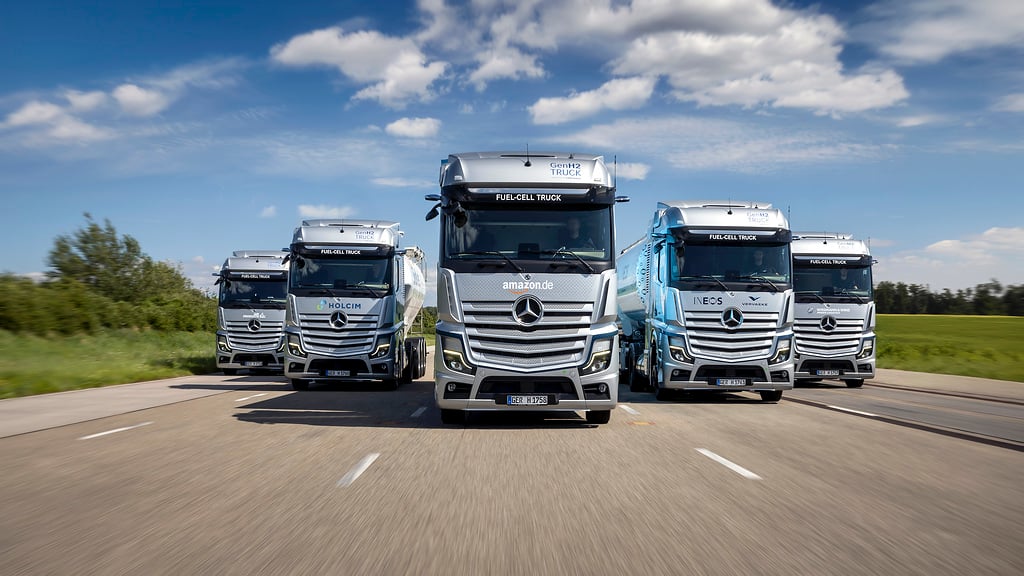After a rigorous testing phase on the test track and public roads, Daimler Truck has entered the next development phase of its fuel cell trucks: initial customer trials of five Mercedes-Benz GenH2 fuel cell prototype trucks have now started. The five trucks will be deployed by Air Products, Amazon, Holcim, INEOS and Wiedmann & Winz in different long-haul applications on specific routes in Germany, such as the transport of building materials, sea containers or cylinder gases.

At the Daimler Truck Test and Development Center in Woerth am Rhein, Martin Daum, Chairman of the Board of Management of Daimler Truck, celebrated the start of the initial customer trials of five Mercedes-Benz GenH2 Truck fuel cell prototype trucks in the presence of Hildegard Müller, President of the German Association of the Automotive Industry (VDA), with Air Products, Amazon, Holcim, INEOS and Wiedmann & Winz. These customers have the opportunity to gain practical experience in long-distance transport with fuel cell trucks at an early stage, during a trial phase of around one year. On the other hand, the Daimler Truck development team acquires valuable insights into the real-life operations of trucks powered by liquid hydrogen, learns about specific customer requirements and can take them into account for series development.

During these first customer trials, the vehicles will remain under the direct supervision and responsibility of the manufacturer. The trucks will be refueled at the designated liquid hydrogen filling stations (sLH2) in Woerth am Rhein (Rhineland-Palatinate) and in the future also in the Duisburg area (North-Rhine Westphalia).
The five semi-trailer tractors will be used by customers in various long-haul applications throughout the trial period. Amazon will use the GenH2 Truck in its logistics operations in Germany, Air Products for the transport of cylinder gases, Wiedmann & Winz for sea containers, Holcim for building materials logistics, and VERVAEKE – the logistics company of INEOS – for PVC and vinyl transportation.
“When it comes to decarbonizing transport, we are focusing on battery-electric and hydrogen-based drives. With regard to hydrogen drives, we are now taking another important step towards series readiness: we are starting the trials of our Mercedes-Benz GenH2 Trucks in real-life daily transport operations with our customers. However, it is important to note that high-performance CO2-neutral vehicles alone will not be enough to make sustainable transportation successful. This also requires a corresponding charging and refueling infrastructure, as well as cost parity with conventional vehicles. Although policymakers and energy companies are already active here, we urgently need even more momentum, across entire Europe!”
said Martin Daum, Chairman of the Board of Management of Daimler Truck.

“When it comes to heavy-duty commercial vehicles, e-mobility cannot be equated exclusively with battery-electric drive. Rather, the fuel cell drive powered by hydrogen must also be considered as part of the diversity of available technologies. Manufacturers have the corresponding models in development and production, and now the political framework conditions must finally be created: a needs-based network of hydrogen filling stations and the associated infrastructure must be built up urgently. There is an urgent need for action for politicians, the German Federal Network Agency and the energy industry.”
added Hildegard Müller, President of the German Association of the Automotive Industry (VDA).

GenH2 Truck
The development engineers of Daimler Truck have based the GenH2 Truck on the characteristics of the conventional Mercedes-Benz Actros long-haul truck in terms of payload, range and performance. The Mercedes-Benz GenH2 Trucks, which are used in these first customer trials, offer a payload of approx. 25 tons at a gross combination weight (GCW) of 40 tons. Two special liquid hydrogen tanks and a powerful fuel-cell system by cellcentric, the Joint Venture of Daimler Truck and Volvo Group, enable the high payload and long range. They represent the centerpiece of the GenH2 Truck.
The fuel-cell system of the GenH2 Truck delivers 300 kilowatts (2 x150 kW) and the battery provides an additional 400 kW temporarily. At 70 kWh, the storage capacity of the battery is relatively low, as it is not intended to meet energy needs, but mainly to be switched on to provide situational power support for the fuel cell, for example during peak loads while accelerating or while driving uphill fully loaded. At the same time, the relatively light battery allows a higher payload. It is recharged with braking energy and excess fuel-cell energy. A core element of the sophisticated operating strategy of the fuel-cell and battery system is a cooling and heating system that keeps all components at a suitable operating temperature, thus ensuring maximum durability. In a pre-series version, the two electric motors are designed for a total of 2 x 230 kW continuous power and 2 x 330 kW maximum power. The GenH2 Truck thereby delivers a torque of 2 x 1,577 Nm or 2 x 2,071 Nm.
The two stainless-steel liquid-hydrogen tanks of the GenH2 Truck have a particularly high storage capacity of 88 kilograms (44 kg each), perfectly suited for covering long distances. The stainless-steel tank system consists of two tubes, one within the other, that are vacuum isolated and connected to each other.

Liquid hydrogen enables higher payload
Daimler Truck prefers liquid hydrogen in the development of hydrogen-based drives. In this aggregate state, the energy carrier has a significantly higher energy density. As a result, more hydrogen can be carried, which significantly increases the range and enables comparable performance of the vehicle with that of a conventional diesel truck. Transportation efforts can be significantly reduced with liquid hydrogen, and liquid hydrogen tanks also offer advantages in terms of cost and weight compared to compressed gaseous hydrogen. Thus, the use of liquid hydrogen enables a higher payload. This makes the Mercedes-Benz GenH2 Truck just as suitable for flexible and demanding long-haul road transportation as conventional diesel trucks. In September 2023, Daimler Truck successfully demonstrated this when a public road approved prototype of the Mercedes-Benz GenH2 Truck completed the #HydrogenRecordRun, covering 1,047 km with one tank filling of liquid hydrogen on board.

Source: Daimler Truck


 Copyright 2017-2025 All rights reserved.
Copyright 2017-2025 All rights reserved.